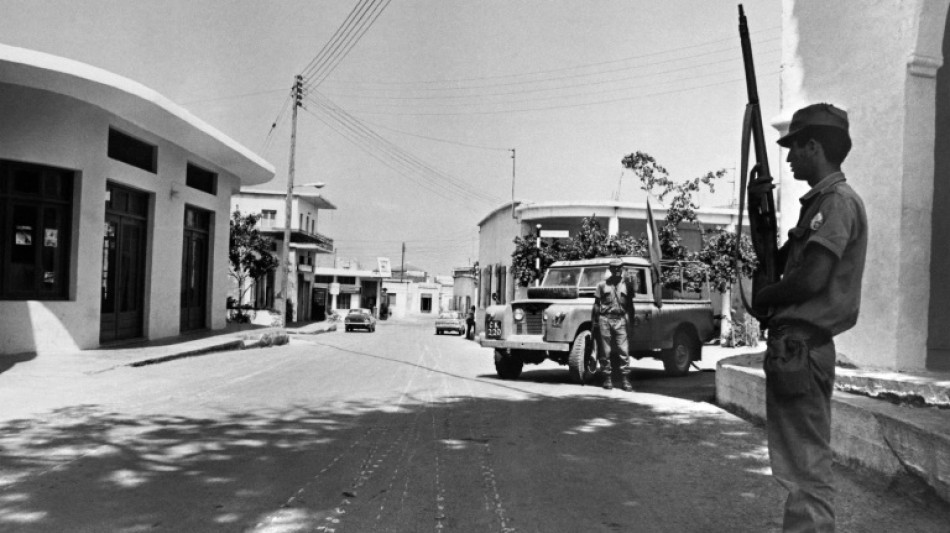
-
 AI reshaping the battle over the narrative of Maduro's US capture
AI reshaping the battle over the narrative of Maduro's US capture
-
Penguins bring forward breeding season as Antarctica warms: study

-
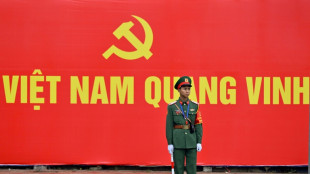 Vietnam leader pledges graft fight as he eyes China-style powers
Vietnam leader pledges graft fight as he eyes China-style powers
-
Ukrainian makes soldier dad's 'dream come true' at Australian Open

-
 'Timid' Keys makes shaky start to Australian Open title defence
'Timid' Keys makes shaky start to Australian Open title defence
-
Indiana crowned college champions to complete fairytale season

-
 South Koreans go cuckoo for 'Dubai-style' cookies
South Koreans go cuckoo for 'Dubai-style' cookies
-
Harris leads Pistons past Celtics in thriller; Thunder bounce back

-
 Tjen first Indonesian to win at Australian Open in 28 years
Tjen first Indonesian to win at Australian Open in 28 years
-
Long-delayed decision due on Chinese mega-embassy in London
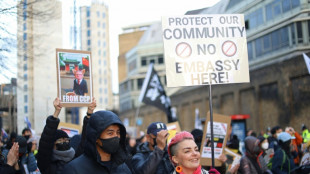
-
 Djokovic jokes that he wants slice of Alcaraz's winnings
Djokovic jokes that he wants slice of Alcaraz's winnings
-
Trump tariff threat 'poison' for Germany's fragile recovery

-
 Tourists hit record in Japan, despite plunge from China
Tourists hit record in Japan, despite plunge from China
-
Jittery Keys opens Melbourne defence as Sinner begins hat-trick quest

-
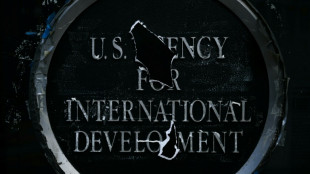 The impact of Trump's foreign aid cuts, one year on
The impact of Trump's foreign aid cuts, one year on
-
Belgian court weighs trial for ex-diplomat over Lumumba killing

-
 Inside China's buzzing AI scene year after DeepSeek shock
Inside China's buzzing AI scene year after DeepSeek shock
-
Asian markets sink, silver hits record as Greenland fears mount

-
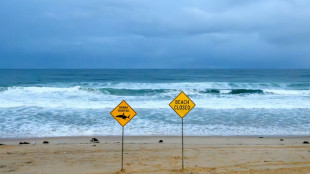 Shark bites surfer in Australian state's fourth attack in 48 hours
Shark bites surfer in Australian state's fourth attack in 48 hours
-
North Korea's Kim sacks vice premier, rails against 'incompetence'
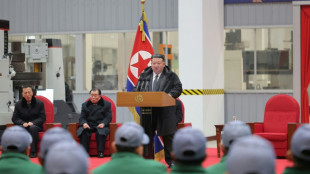
-
 Spain mourns as train crash toll rises to 40
Spain mourns as train crash toll rises to 40
-
'Very nervous' Keys makes shaky start to Australian Open title defence

-
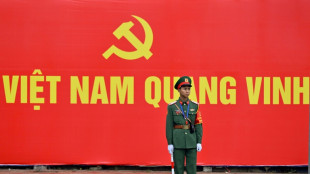 Vietnam leader promises graft fight as he eyes China-style powers
Vietnam leader promises graft fight as he eyes China-style powers
-
Dad-to-be Ruud ready to walk away from Australian Open

-
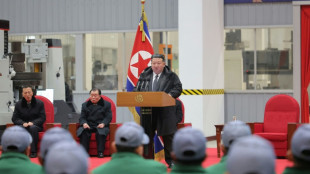 North Korea's Kim sacks senior official, slams 'incompetence'
North Korea's Kim sacks senior official, slams 'incompetence'
-
Farewells, fresh faces at Men's Fashion Week in Paris

-
 'I do not want to reconcile with my family' says Brooklyn Peltz Beckham
'I do not want to reconcile with my family' says Brooklyn Peltz Beckham
-
EU leaders take stage in Davos as Trump rocks global order

-
 Blast at Chinese restaurant in Kabul kills 7
Blast at Chinese restaurant in Kabul kills 7
-
Warner hits 'Sinners' and 'One Battle' tipped for Oscar nominations

-
 Colombian paramilitary-turned-peace-envoy sentenced over atrocities
Colombian paramilitary-turned-peace-envoy sentenced over atrocities
-
Gilgeous-Alexander leads Thunder in rout of Cavaliers

-
 Seahawks blow as Charbonnet ruled out for rest of season
Seahawks blow as Charbonnet ruled out for rest of season
-
Kostoulas stunner rescues Brighton draw after penalty row

-
 Man Utd greats tell Martinez to 'grow up' as feud rumbles on
Man Utd greats tell Martinez to 'grow up' as feud rumbles on
-
LeBron James' All-Star streak over as starters named

-
 Allies tepid on Trump 'peace board' with $1bn permanent member fee
Allies tepid on Trump 'peace board' with $1bn permanent member fee
-
Ninth policeman dies in Guatemala gang riots, attacks

-
 Man City's Foden to play through pain of broken hand
Man City's Foden to play through pain of broken hand
-
Milan Fashion Week showcases precision in uncertain times

-
 Public media in Europe under unprecedented strain
Public media in Europe under unprecedented strain
-
Africa Cup of Nations refereeing gets a red card

-
 Tributes pour in after death of Italian designer Valentino
Tributes pour in after death of Italian designer Valentino
-
Bills fire coach McDermott after playoff exit: team

-
 Chile wildfires rage for third day, entire towns wiped out
Chile wildfires rage for third day, entire towns wiped out
-
Valentino, Italy's fashion king who pursued beauty at every turn, dies at 93

-
 France PM to force budget into law, concedes 'partial failure'
France PM to force budget into law, concedes 'partial failure'
-
Allies tepid on Trump 'peace board' with $1bln permanent member fee

-
 'My soul is aching,' says Diaz after AFCON penalty miss
'My soul is aching,' says Diaz after AFCON penalty miss
-
Ex-OPEC president in UK court ahead of corruption trial


Key dates in Cyprus's post-independence history
This month marks 50 years since the dramatic events of 1974 left the Mediterranean holiday island of Cyprus divided to this day.
On July 15, 1974, the military junta then in power in Athens engineered a coup in Cyprus seeking to end its independence and unite the island with Greece.
Five days later, Turkish troops landed on the north coast, beginning an invasion that saw them occupy a third of the island, including Turkish Cypriot neighbourhoods of the divided capital Nicosia.
AFP looks at key dates in the island's history:
- 1960: Independence from Britain -
On August 16, 1960, Cyprus becomes independent from Britain after a guerrilla campaign waged by fighters aiming to unite the island with Greece.
Its constitution guarantees representation for the Turkish Cypriots, who at the time make up around 18 percent of the population, and forbids both union with Greece or Turkey and partition.
In December 1963, violence erupts between the two communities as Greek Cypriot leaders seek to override parts of the constitution. Turkish Cypriots withdraw to enclaves, some of them defended by armed fighters.
In March 1964, a UN peacekeeping force for Cyprus (UNFICYP) is established.
Between 1963 and 1974, around 2,000 people are listed as missing in clashes between the two communities.
- 1974: Coup triggers invasion -
On July 15, 1974, members of the Greek Cypriot National Guard overthrow president Archbishop Makarios in a coup sponsored by the military junta then ruling Greece.
On July 20, Turkey, invoking a 1959 agreement with Greece and Cyprus's then colonial ruler Britain, invades the north of the island saying its aim is to protect the Turkish Cypriot minority.
Three days later, the collapse of the juntas in both Athens and Nicosia leads to an interim administration and the eventual restoration of Makarios.
On July 30, Turkey, Greece and Britain meet in Geneva and establish a 180-kilometre (112 mile) long Green Line patrolled by UN troops dividing the island.
The Greek Cypriot community says the conflict left 3,000 dead and 1,400 missing. It also led to major population movements affecting around 162,000 Greek Cypriots and 48,000 Turkish Cypriots, according to the Peace Research Institute Oslo (PRIO).
- 1983: Turkish Cypriots break away -
On November 15, 1983, Turkish Cypriot leader Rauf Denktas proclaims a breakaway Turkish Republic of Northern Cyprus in the 38 percent of the island controlled by Turkish troops. It is recognised only by Turkey.
- 2003: Crossing the Green Line -
In April 2003, as peace talks falter, Turkish Cypriot authorities allow Greek Cypriots to visit the north and Turkish Cypriots to travel in the other direction across the Green Line for the first time.
- 2004: Greek Cypriot 'no' vote -
On April 24, 2004, Greek Cypriot voters overwhelmingly reject a UN reunification plan approved by Turkish Cypriots in a simultaneous referendum.
On May 1, Cyprus joins the European Union still a divided island, with Turkish Cypriots denied the full benefits of membership.
- 2008-2017: Peace talks collapse -
On September 3, 2008, the leaders of the two communities enter intensive UN-sponsored peace talks, which are joined by the three treaty powers Britain, Greece and Turkey before collapsing in 2017.
- 2020: Turkish Cypriots elect nationalist -
In October 2020, Turkish Cypriots elect nationalist Ersin Tatar, an ally of Turkish President Recep Tayyip Erdogan, as their leader.
Tatar narrowly defeats pro-reunification incumbent Mustafa Akinci, in what is widely seen as a symptom of growing Turkish Cypriot disillusion over the prospects for a deal.
A.Ruegg--VB



